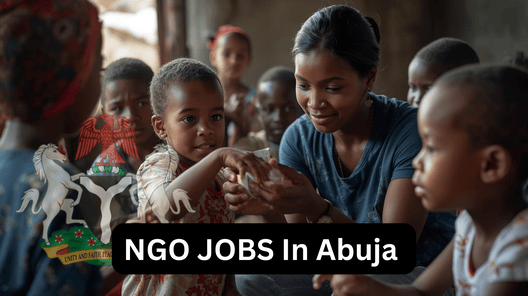NGO Jobs in Abuja 2025: Complete Guide to Top Opportunities & How to Apply

Discover Top NGO jobs in Abuja 2025. Find verified vacancies, salary guides, application tips & direct links to apply.
NGO Jobs in Abuja 2025: Complete Guide
Abuja, Nigeria’s Federal Capital Territory, continues to be the epicenter of non-governmental organization (NGO) activities in 2025. With numerous international and local NGOs establishing their headquarters in the city, job seekers are presented with diverse opportunities to build meaningful careers while making a positive impact on communities across Nigeria.
Why Choose an NGO Career in Abuja?
Working for an NGO in Abuja offers unique advantages that extend beyond traditional employment. The city hosts major international organizations including UNICEF, WHO, UNDP, and Save the Children, alongside prominent local NGOs focusing on healthcare, education, humanitarian aid, and community development.
NGO professionals in Abuja enjoy competitive compensation packages, opportunities for professional development, and the satisfaction of contributing to sustainable development goals.
The city’s position as Nigeria’s administrative capital means NGO workers often engage directly with policymakers, government agencies, and donor organizations, creating unparalleled networking and career advancement opportunities.
Read Also: CDCFIB Shortlisted Candidates 2025/2026: Complete List, Screening Requirements & Download Guide
Types of NGO Jobs Available in Abuja 2025
The NGO sector in Abuja spans multiple disciplines and expertise levels. Current opportunities include:
Program and Project Management Roles: Program managers, project coordinators, and monitoring and evaluation specialists are in high demand. These professionals oversee implementation of development projects, ensure compliance with donor requirements, and measure impact across various thematic areas.
Technical Specialists: Health professionals, education specialists, WASH (Water, Sanitation, and Hygiene) experts, agriculture consultants, and gender advisors find abundant opportunities. Organizations seek specialists who can provide technical guidance and capacity building to implementing partners.
Operations and Administration: Finance managers, human resources officers, procurement specialists, and logistics coordinators ensure smooth organizational functioning. These roles are critical for maintaining operational excellence and donor accountability.
Field-Based Positions: Community mobilizers, field officers, and outreach workers serve as the bridge between NGOs and beneficiary communities. These roles often require travel to various states but are typically based in Abuja for coordination purposes.
Communications and Advocacy: Communications officers, advocacy specialists, and media relations managers help amplify NGO messages, document success stories, and engage stakeholders on critical development issues.
Top Platforms to Find NGO Jobs in Abuja
Several reliable platforms aggregate NGO job opportunities in Abuja, making your job search more efficient:
MyJobMag remains one of Nigeria’s leading job portals, featuring a dedicated section for NGO positions. Their platform offers verified NGO vacancies in Abuja updated daily, with user-friendly filters for location, experience level, and job category.
Indeed Nigeria hosts numerous NGO job listings in Abuja, with opportunities ranging from entry-level to senior management positions. The platform’s job alert feature ensures you never miss new postings matching your criteria.
NGO Jobs in Africa specializes exclusively in non-profit opportunities across the continent, with a substantial focus on Nigerian vacancies. This platform authenticates all job postings, reducing the risk of fraudulent listings.
Glassdoor provides not only job listings but also company reviews and salary insights for NGOs operating in Abuja, helping candidates make informed decisions about potential employers.
ReliefWeb is essential for humanitarian and development professionals, featuring international NGO positions with organizations responding to Nigeria’s humanitarian needs.
UNJobs aggregates United Nations and affiliated organization vacancies for Abuja duty station, including positions with UN agencies, international NGOs, and development partners.
Essential Qualifications for NGO Jobs in Abuja
While specific requirements vary by position and organization, certain qualifications significantly enhance your competitiveness in Abuja’s NGO job market.
Most program and management positions require a bachelor’s degree minimum, with many senior roles preferring master’s degrees in relevant fields such as international development, public health, social sciences, project management, or business administration. Technical specialists typically need advanced degrees and professional certifications in their areas of expertise.
Previous experience in the development sector is highly valued. Entry-level candidates can gain experience through volunteer work, internships with local NGOs, or graduate assistant positions. Mid-level positions typically require three to five years of relevant experience, while senior management roles demand seven or more years with progressive responsibility.
Technical skills are increasingly important. Proficiency in monitoring and evaluation frameworks, grant management, budget development, and results-based management distinguishes strong candidates. Familiarity with donor requirements from organizations like USAID, DFID, EU, and Global Fund is advantageous.
Language skills beyond English can be beneficial, particularly French for West African regional roles or local Nigerian languages for community-based positions. Computer literacy, including MS Office Suite and data management tools, is universally expected.
Application Tips for NGO Jobs in Abuja
Succeeding in the competitive NGO job market requires strategic preparation and presentation. Tailor your CV to highlight relevant experience, using achievement-based language with quantifiable results. NGO recruiters look for evidence of impact rather than mere job descriptions.
Your cover letter should demonstrate genuine passion for development work and specific knowledge about the hiring organization’s mission and programs. Research the NGO thoroughly and articulate how your skills align with their current strategic priorities.
Prepare for competency-based interviews that assess your problem-solving abilities, cultural sensitivity, and alignment with NGO values. Be ready to provide specific examples demonstrating skills like teamwork, leadership, adaptability, and ethical decision-making.
Professional networking remains invaluable in Nigeria’s NGO sector. Attend development sector events, join professional associations like the Network of Civil Society Organizations of Nigeria (NOCSON), and engage with NGO professionals on LinkedIn. Many positions are filled through referrals and professional networks before public advertisement.
Salary Expectations for NGO Jobs in Abuja 2025
Compensation in Nigeria’s NGO sector varies significantly based on organization size, funding sources, and position level. International NGOs and UN agencies typically offer higher salaries than local NGOs, though this gap is narrowing.
Entry-level positions generally range from ₦150,000 to ₦350,000 monthly, depending on the organization and role complexity. Mid-level program officers and specialists earn between ₦400,000 and ₦800,000 monthly. Senior management positions, including program directors and country representatives, can command ₦1,000,000 to ₦3,000,000 or more monthly.
Beyond base salary, most international NGOs offer comprehensive benefits packages including housing allowances, medical insurance, pension contributions, professional development budgets, and annual leave exceeding Nigeria’s statutory minimum. Some organizations provide hardship allowances for staff willing to serve in challenging field locations.
Career Growth in the NGO Sector
The NGO sector in Abuja offers substantial career advancement opportunities for dedicated professionals. Many organizations prioritize internal promotion and staff development, recognizing that investing in their workforce enhances program quality and organizational stability.
Professional development opportunities abound, with many NGOs offering funded training, conference attendance, and advanced degree support. Online platforms provide access to specialized courses in areas like humanitarian response, gender mainstreaming, and results-based management.
Career progression typically follows paths from field officer to program officer, then to program manager, senior program manager, and potentially to director-level positions. Technical specialists may advance to become chief technical advisors or consultants commanding premium rates.
Networking within the development sector opens doors to opportunities across organizations. Many professionals build careers by strategically moving between organizations to gain diverse experience, access higher positions, or work on different thematic areas of interest.
Current Trends Shaping NGO Jobs in Abuja 2025
The NGO landscape in Abuja continues evolving in response to global and local developments. Digital transformation has accelerated, with organizations seeking professionals skilled in digital programming, online community engagement, and data analytics. Remote work capabilities developed during the pandemic persist, with hybrid work arrangements becoming standard for many roles.
Localization of aid remains a priority, with international NGOs increasingly partnering with and strengthening local civil society organizations. This creates opportunities for Nigerian professionals to access leadership positions previously dominated by international staff.
Climate change and environmental sustainability have emerged as cross-cutting themes, with NGOs across sectors integrating climate adaptation and mitigation into their programming. Professionals with environmental expertise find opportunities beyond traditional environmental NGOs.
The humanitarian-development nexus continues shaping programming in Nigeria’s Northeast and other conflict-affected areas, creating demand for professionals who can navigate both humanitarian response and long-term development objectives.
Legitimate NGO Job Search: Avoiding Scams
Unfortunately, fraudulent job postings targeting desperate job seekers persist in Nigeria. Protect yourself by applying through reputable job platforms and verifying opportunities directly with hiring organizations.
Legitimate NGOs never request payment for job applications, interviews, or employment processing. Be suspicious of unsolicited job offers arriving via WhatsApp or email without your having applied. Verify the authenticity of communications by checking official organizational websites and contacting HR departments through listed contact information.
Conduct interviews in professional settings rather than informal locations. Research the organization’s registration status with Nigeria’s Corporate Affairs Commission. Genuine NGOs have transparent organizational information, including physical addresses, active websites, and verifiable programs.
Where to Apply for NGO Jobs in Abuja Today
Ready to start your NGO career journey? Begin your search on these trusted platforms:
- MyJobMag NGO Jobs Abuja – Daily updated verified vacancies with easy application processes
- Indeed NGO Opportunities – Comprehensive listings with salary insights and company reviews
- NGO Jobs in Africa – Specialized platform focusing exclusively on authenticated NGO positions
- Glassdoor Abuja NGO Roles – Jobs with employer ratings and interview insights
- ReliefWeb Nigeria Jobs – International humanitarian and development positions
Conclusion
NGO jobs in Abuja in 2025 offer meaningful career opportunities for professionals committed to sustainable development and social impact. With the right qualifications, strategic job search approach, and persistence, you can secure a rewarding position that aligns your professional ambitions with your desire to contribute to Nigeria’s development.
The sector continues expanding, with new organizations establishing presence in Abuja while existing NGOs scale their operations. Whether you’re an experienced development professional or an enthusiastic entry-level candidate, Abuja’s vibrant NGO ecosystem holds opportunities waiting for dedicated individuals ready to make a difference.
Start your search today by exploring current NGO vacancies in Abuja, tailoring your application materials, and connecting with development sector professionals. Your next career opportunity in Nigeria’s thriving NGO sector awaits.
Frequently Asked Questions (FAQs)
1. What are the most in-demand NGO jobs in Abuja right now?
Program managers, monitoring and evaluation specialists, and field coordinators are currently the most sought-after positions in Abuja’s NGO sector. Organizations also actively recruit finance and grants managers, healthcare specialists for public health programs, and WASH experts. Communication and advocacy officers are increasingly in demand as NGOs prioritize visibility and stakeholder engagement. Entry-level positions like program assistants and community mobilizers offer pathways for recent graduates to enter the sector.
2. Do I need prior NGO experience to get an NGO job in Abuja?
While many mid-level and senior positions require previous NGO experience, entry-level opportunities exist for candidates without direct experience. Organizations value relevant skills transferable from other sectors, including project management, data analysis, communications, and finance. Recent graduates can enhance their candidacy through volunteer work with local NGOs, internships, or participating in development-focused student organizations. Consider starting with short-term consultancies or temporary positions to build your NGO resume and demonstrate commitment to development work.
3. How long does the NGO recruitment process typically take in Abuja?
The recruitment timeline varies significantly by organization size and position level. International NGOs typically have more structured processes lasting four to eight weeks, including application review, written assessments, multiple interview rounds, and reference checks. Local NGOs may complete recruitment within two to four weeks. Senior positions often take longer due to extensive stakeholder consultations and approval requirements. Some urgent positions, particularly field-based roles, may be filled within one to two weeks. Patience is essential, as thorough vetting processes ensure quality hires.
4. What salary range can I expect for NGO jobs in Abuja in 2025?
Salaries vary based on organization type, position level, and funding sources. Entry-level positions typically offer ₦150,000 to ₦350,000 monthly. Mid-level program officers and specialists earn ₦400,000 to ₦800,000 monthly. Senior managers and directors command ₦1,000,000 to ₦3,000,000 or higher. International NGOs generally offer more competitive packages than local organizations. Beyond base salary, consider benefits like housing allowances, medical insurance, pension contributions, professional development opportunities, and leave entitlements when evaluating compensation packages.
5. Are there remote NGO job opportunities based in Abuja?
Yes, hybrid and remote work arrangements have become more common in Abuja’s NGO sector since 2020. Many organizations now offer flexible working arrangements, though field-based positions require regular travel and community presence. Administrative, finance, communications, and some technical advisory roles often accommodate remote work. However, most positions still require staff to be based in or regularly present in Abuja for coordination meetings, donor engagements, and team collaboration. When applying, inquire about specific work arrangement policies, as these vary significantly between organizations.
6. How can I verify if an NGO job posting in Abuja is legitimate?
Verify job postings by checking the organization’s official website for the vacancy announcement. Legitimate NGOs have professional websites with clear information about their programs, staff, and contact details. Never pay money for applications, interviews, or job processing—authentic organizations never charge candidates. Be cautious of unsolicited job offers via WhatsApp or email. Research the organization through the Corporate Affairs Commission registry. Conduct interviews in professional office settings. Use reputable job platforms like MyJobMag, Indeed, and ReliefWeb rather than responding to social media posts. Trust your instincts—if an opportunity seems too good to be true, investigate thoroughly before proceeding.
7. What qualifications and skills do most NGO employers in Abuja look for?
Most NGO positions require minimum bachelor’s degrees in relevant fields like international development, social sciences, public health, or business administration. Senior roles often prefer master’s degrees. Technical skills highly valued include monitoring and evaluation, grant management, budget development, and report writing. Computer proficiency including MS Office Suite and data management software is essential. Soft skills like cultural sensitivity, adaptability, teamwork, and communication are critical. Knowledge of donor requirements (USAID, DFID, EU) provides competitive advantage. Language skills, particularly local Nigerian languages for field work or French for regional roles, enhance candidacy. Demonstrated passion for development work and alignment with organizational values are universally important.


